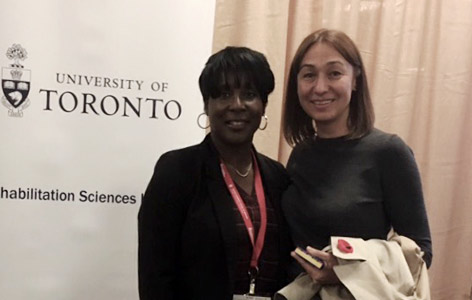Home page Description:
Exploring the advances in rehabilitation medicine.
Posted On: December 19, 2016

Image Caption:
Conference attendee, Tatyana Mollayeva, Postdoctoral Fellow. Supervisor: Dr. Angela Colantonio, TRI
Conference: American Congress of Rehabilitation Medicine 2016, Oct 30-Nov 4, 2016, Chicago, IL, USA
Conference Highlight: American Congress of Rehabilitation Medicine yearly holds the largest interdisciplinary rehabilitation research conference in the world with the content for chronic disabling conditions including brain injury, spinal cord injury, stroke, pain, cancer, neurodegenerative disorders, etc. I have presented my research at this conference yearly since 2012, getting exposed to advances and movement directions in the fields of rehabilitation.
Conference Article:
In my opinion, most advances in the field of rehabilitation are happening in the area of eHealth Technology. During the meeting numerous respectful presenters devoted a great part towards electronic technology (i.e., telehealth, eHealth, mHealth, etc.), presenting largely on its effectiveness and novel benefits. Less focus was placed on challenges and limitations of these new technologies in term of policy and regulations, and patients’ and clinicians’ training.
Pediatric rehabilitation research speedily moves ahead. Pediatric-specific programs and treatment facilities equipped by novel technology and specialized qualified specialists produce top research evidence on the effectiveness of certain interventions in the field of rehabilitation.
Spinal cord injury research continues to focus on functional electrical stimulation as a mean to improve function. Holistic approach (RCTs) towards improvements of certain outcomes did not produce statistically significant results.
Chronic pain research continues to focus of psychological distress as a cause-effect. A paradigm shift towards a more holistic approach is underway.
Rehabilitation of impairments associated with aging: great focus is placed on noncompetitive activities, i.e., walking, dancing, etc. as a mean to improve motor function, and sensory tasks, i.e., learning music, singing, attending to new tasks as a mean to enhance cognition. Physical activities for mind and brain health are reported to be beneficial in all presented studies (with no exception)—a shift towards physical exercise enabling a patient to improve their own outcomes will also reduce the burden on healthcare system.
Some advances in term of focusing on sex differences as it related to rehabilitation outcomes and different intervention approaches.
Cognitive rehabilitation: no advances since last year—same techniques and interventions; older theories still in place i.e. hierarchy of focused attention vs novel paradigms which had emerged from neuroscience a few years ago: interrelatedness of levels of attention, i.e., focused, sustained, alternating, divided.
Conference Highlight: American Congress of Rehabilitation Medicine yearly holds the largest interdisciplinary rehabilitation research conference in the world with the content for chronic disabling conditions including brain injury, spinal cord injury, stroke, pain, cancer, neurodegenerative disorders, etc. I have presented my research at this conference yearly since 2012, getting exposed to advances and movement directions in the fields of rehabilitation.
Conference Article:
In my opinion, most advances in the field of rehabilitation are happening in the area of eHealth Technology. During the meeting numerous respectful presenters devoted a great part towards electronic technology (i.e., telehealth, eHealth, mHealth, etc.), presenting largely on its effectiveness and novel benefits. Less focus was placed on challenges and limitations of these new technologies in term of policy and regulations, and patients’ and clinicians’ training.
Pediatric rehabilitation research speedily moves ahead. Pediatric-specific programs and treatment facilities equipped by novel technology and specialized qualified specialists produce top research evidence on the effectiveness of certain interventions in the field of rehabilitation.
Spinal cord injury research continues to focus on functional electrical stimulation as a mean to improve function. Holistic approach (RCTs) towards improvements of certain outcomes did not produce statistically significant results.
Chronic pain research continues to focus of psychological distress as a cause-effect. A paradigm shift towards a more holistic approach is underway.
Rehabilitation of impairments associated with aging: great focus is placed on noncompetitive activities, i.e., walking, dancing, etc. as a mean to improve motor function, and sensory tasks, i.e., learning music, singing, attending to new tasks as a mean to enhance cognition. Physical activities for mind and brain health are reported to be beneficial in all presented studies (with no exception)—a shift towards physical exercise enabling a patient to improve their own outcomes will also reduce the burden on healthcare system.
Some advances in term of focusing on sex differences as it related to rehabilitation outcomes and different intervention approaches.
Cognitive rehabilitation: no advances since last year—same techniques and interventions; older theories still in place i.e. hierarchy of focused attention vs novel paradigms which had emerged from neuroscience a few years ago: interrelatedness of levels of attention, i.e., focused, sustained, alternating, divided.

